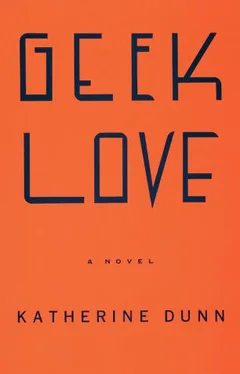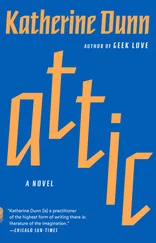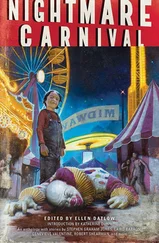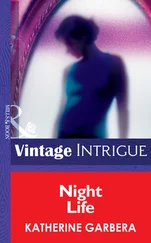Elly claimed that it was malice on Arty’s part. “He has always had a nasty attitude toward the norms. Iphy and I like them except for the hecklers and drunks. They’re good to us. Papa tends the crowds like a flock of geese. They’re a lot of work and a bit of a nuisance but he loves them because they’re his bread and butter. Mama and Chick — and you too, Oly — you three don’t even know the crowds are there. You don’t have to work them. But Arty hates them. He’d wipe them all out if he could, as easy as torching an ant hill.”
“Truth” was Elly’s favorite set of brass knuckles, but she didn’t necessarily know the whole elephant. If what she said about Arty was “true,” it still wasn’t the whole truth.
Arty said, “We have this advantage, that the norms expect us to be wise. Even a rat’s-ass dwarf jester got credit for terrible canniness disguised in his foolery. Freaks are like owls, mythed into blinking, bloodless objectivity. The norms figure our contact with their brand of life is shaky. They see us as cut off from temptation and pettiness. Even our hate is grand by their feeble lights. And the more deformed we are, the higher our supposed sanctity.”
The first time I remember him talking like that was one very rare night when he had an ear infection and couldn’t do his act. I stayed with him while the rest of the family worked. He sat on the built-in couch in the family van surrounded by the popcorn he’d spilled, the kernels getting smashed into the upholstery as he bounced around talking and dipping his face into his bowl of popcorn and nipping at hot chocolate through his straw. I laughed because he had butter smeared around his eyes as he pumped this piffle at me.
I was crushed when Arty ousted me from the Oracle. Originally, I had been the one who sorted through the question cards and actually went on stage to press the face of the chosen card against the side of the tank while Arty hovered, bubbling on the other side, to read it and then shot to the surface to give the answer. Then Arty decided he wanted a redhead to do it. He had them parade in a giggling line outside their dorm wearing shorts and bras so he could choose the best figure. He said the crowd would have more respect for him if he was waited on by a good-looking redhead. “They’ll wonder if I’m balling her, decide that I am, and think I must be a hell of a guy if this gorgeous gash puts out for me even though I’m so fucked up. If it’s Oly waiting on me, they figure it’s just birds of a feather.”
I still took care of him after each show, but for a long time I sulked and ignored the act.
The Aqua Boy changed again. For a while, he answered only generic questions distilled from the scrawled bewilderments and griefs that piled up on the three-by-five cards. Then he stopped answering at all and just told them what he wanted them to hear. Testifying, he called it.
What Arty wanted the crowds to hear was that they were all hormone-driven insects and probably deserved to be miserable but that he, the Aqua Boy, could really feel for them because he was in much better shape. That’s what it sounded like to me, but the customers must have been hearing something different because they gobbled it up and seemed to enjoy feeling sorry for themselves. You might figure a mood like that would be bad for the carnival business but it worked the opposite way. The crowd streaming out from Arty’s act would plunge deeper into the midway than all the rest, as though cantankerously determined to treat themselves to the joys of junk food and simp twisters to make up for the misery that had just been revealed to them.
Arty thought about the process a lot. Sometimes he’d tell me things, only me, and only because I worshiped him and didn’t matter.
“I think I’m getting a notion of how to do this. O.K., a carnival works because people pay to feel amazed and scared. They can nibble around a midway getting amazed here and scared there, or both. And do you know what else? Hope. Hope they’ll win a prize, break the jackpot, meet a girl, hit a bull’s-eye in front of their buddies. In a carnival you call it luck or chance, but it’s the same as hope. Now hope is a good feeling that needs risk to work. How good it is depends on how big the risk is if what you hope doesn’t happen. You hope your old auntie croaks and leaves you a carload of shekels, but she might leave them to her cat. You might not hit the target or win the stuffed dog, you might lose your money and look like a fool. You don’t get the surge without the risk. Well. Religion works the same way. The only difference is that it’s more amazing than even Chick or the twins. And it’s a whole lot scarier than the Roll-a-plane or the Screamer, or any simp twister. This scare stuff laps over into the hope department too. The hope you get from religion is a three-ring, all-star hope because the risk is outrageous. Bad! Well, I’m working on it. I’ve got the amazing part down. And the scary bits are a snap. But I’ve got to come up with a hope.”
Arty had the advance men make up special flyers to hit certain churches. “Refuge!” they blared. “Arturo, the Aqua Boy!” and then a list of our dates and sites. Though Arty never mentioned anything resembling a god, or an outside will, or life after death, church groups started showing up. In the grim blasted regions where the soil had failed or the factories were shut down, whole congregations would drift through the gates, ignoring the lights and sights of the midway, and find their way to Arty’s tent. They paid their price and sat numbly in clumps on the bleachers waiting as long as it took for his show to begin. When it was over, they would leave the grounds together, ignoring everything.
“Too poor to play,” Papa said.
“The one buck they’ve got, I’ll get,” said Arty. But it wasn’t the money that excited him. It was that those who never would have come to the carnival came just for him.
Mama was dreamily pleased. “Arty’s spreading his wings,” she said, nodding to herself. But his wingspread took in more than the bleachers in his own tent. And all this time he was taking over more and more control of the carnival itself, and becoming more obvious in the orders he gave.
10. Snake Dance — Immaculate
I was eleven years old that year. Chick turned six and the twins were approaching their fourteenth birthday. Arty was sixteen and in a hurry.
He got his own big van with a platform to connect it to the family van. No fuss about it. Papa just shrugged when Arty had him write out the check. The guards lugged the furniture from the dressing room behind Arty’s stage, and I arranged it. Mama busied herself moving Chick into Arty’s long-abandoned cubicle in the family van.
As Arty got stronger, Al and Lil wilted. Each week they seemed softer and browner at the edges. Lil was scatty and vague more often. You could catch her any hour of the day with her collection of pills and capsules shuttling in and out of the handbag she kept by her. She did her work but she got thinner and her breasts began to droop. Her clothes didn’t hang on her in the old smooth way. Her makeup was a little blurry to begin with and tended to slip by lunchtime. Long before closing each night the mascara and rouge would slide into thick smudges. There was something missing in her eyes.
This was the year she decided she had taught the twins all that she was able, and hired the fancy piano man to teach them. Arty claimed that this was the cause of her frail weeping. The twins said it had started after Chick was born and had simply increased.
We didn’t ask for Papa’s opinion. Al was listless one minute and irritable the next. He’d go out to give orders in the morning and find that Arty had already passed the word for the day. He’d nag and snap and stand over the crews while work was being done. He took to spending more time with Horst and to showing up half buttoned into his tailcoat and with his mustache unwaxed for his Ringmaster routines. Then Dr. Phyllis appeared.
Читать дальше












